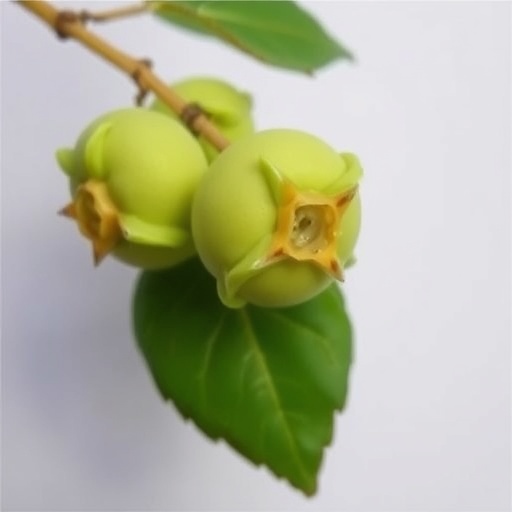Recent developments in the realm of herbal medicine have drawn considerable attention, particularly when it comes to evaluating the efficacy and safety of plant extracts. Among these, the leaves of Paederia foetida Linn., commonly known for its medicinal properties, have prompted significant research interest due to their reported antihyperlipidemic, antihyperglycaemic, and antioxidant activities. However, just as swiftly as the research community embraces new findings, it has become increasingly vigilant about ensuring that published studies meet high ethical and methodological standards.
A recent communication in BMC Complementary Medicine and Therapies that raises eyebrows is a retraction note concerning a previous publication on the leaf extract of Paederia foetida. This development underscores the importance of maintaining rigorous academic standards in natural product research, especially when health claims are implicated. The original article claimed promising results regarding the extract’s potential to help manage lipid profiles and blood sugar levels while also exhibiting antioxidative characteristics. These health benefits could have significant implications for the prevention and management of chronic diseases, including diabetes and cardiovascular disorders.
In the context of this retraction note, the authors expressed regret over the methodological flaws and potential inaccuracies inherent in their study. Such flaws, which might include improper statistical analysis, insufficient sample sizes, or lack of appropriate controls, can render a study’s conclusions unreliable. In the fast-paced world of biomedical research, the stakes are high, particularly when findings are applied to public health recommendations or lead to the development of new therapeutic options.
The significant interest in Paederia foetida springs from its traditional use in various cultures, where it has been utilized for centuries to treat ailments ranging from digestive issues to inflammatory conditions. Given its long history of ethnomedical use, any claims about its modern applications must be subjected to rigorous scientific scrutiny. The herbal extract’s bioactive compounds, such as flavonoids and polyphenols, are thought to contribute to its therapeutic properties. Yet, absent transparent research practices, the integrity of such claims falters, leading to the necessity of retractions like the one seen in recent communications.
Moreover, the discussion surrounding the retraction raises broader issues regarding the pressures faced by researchers to produce novel and impactful results. The academic environment often incentivizes results-driven research, which can inadvertently lead to compromised ethical standards. In a field where hypotheses are tested through empirical study, the implications of disseminating untrustworthy information can lead to misguided public health strategies or even risks to patient safety.
Despite the pitfalls highlighted by the retraction, the dialogue has prompted increased awareness about ethical research practices amongst scholars. It has fostered discussions about the value of transparency, reproducibility, and peer review in the scientific community, ultimately pushing for a culture that prioritizes integrity over expediency. The scrutiny on studies, especially those related to herbal medicine, can serve as a reminder that all claims warrant thorough validation, particularly when it involves health products intended for widespread use.
The retraction of this particular study also serves as a cautionary tale for both researchers and practitioners. It reminds them that rigor in research methodology is paramount, as discrepancies in study results can lead to misguided clinical practices. It is crucial for healthcare providers to rely on robust evidence when recommending treatments, especially those derived from herbal sources. Therefore, a thorough analysis of the quality and reliability of research findings is needed as the health community endeavors to navigate the complexities of herbal pharmacology.
As a result of this retraction, it is essential for both scholars and practitioners to remain vigilant and critical of the studies they encounter, ensuring that any claims made are judiciously founded and well-supported by data. The dialogue around the retraction reinforces that science is not just about discovery but about the integrity of the process that leads to knowledge acquisition. Ensuring that science is rigorous and reliable ultimately enhances public trust in research findings, which serves the best interests of the community at large.
The unfolding narrative of Paederia foetida is significant for the ongoing discourse surrounding herbal supplements and natural products. It underscores the importance of a critical evaluation of the existing literature and the need for continuous education on ethical research practices. Such efforts are essential not only for maintaining the credibility of the scientific community but also for ensuring that patients receive safe and effective healthcare options based on sound evidence.
In conclusion, while Paederia foetida holds potential promise in the realm of integrative health practices, the recent retraction signals a pressing need for vigilance in scientific research. The community must remain committed to upholding the highest ethical standards to foster advancements that are both responsible and beneficial. In light of ongoing innovations and developments in herbal medicine, the safeguarding of research integrity is not merely a procedural necessity but a cornerstone of public health advancement.
Subject of Research: Paederia foetida Linn. Leaf extract and its medicinal properties.
Article Title: Retraction Note: Paederia foetida Linn. Leaf extract: an antihyperlipidemic, antihyperglycaemic and antioxidant activity.
Article References:
Kumar, V., Anwar, F., Ahmed, D. et al. Retraction Note: Paederia foetida Linn. Leaf extract: an antihyperlipidemic, antihyperglycaemic and antioxidant activity.
BMC Complement Med Ther 25, 370 (2025). https://doi.org/10.1186/s12906-025-05150-z
Image Credits: AI Generated
DOI: 10.1186/s12906-025-05150-z
Keywords: Paederia foetida, retraction, antihyperlipidemic, antihyperglycaemic, antioxidant, herbal medicine, research ethics.
Tags: antihyperglycaemic effectsantihyperlipidemic propertiesantioxidant activities of plantscardiovascular health claimschronic disease managementdiabetes prevention strategiesethical standards in researchherbal medicine researchmethodological flaws in researchnatural product efficacyPaederia foetida leaf extract benefitsretraction of scientific studies





